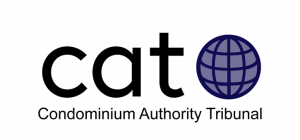 March 2018
March 2018
The Condominium Authority of Ontario (CAO) is a newly established, self-funded, not-for-profit organization governed by an independent Board of Directors. Robin Dafoe, Chief Executive Officer/Registrar of the Condominium Authority of Ontario, provided the following responses to questions from Toronto Condo News.

Why was the CAO created?
In 2015 the Provincial Government initiated an extensive review of condominium law that included input from condominium owners, residents, developers and other experts. Based on the 200 recommendations received, the government passed legislation to establish the CAO as part of the implementation of the Protecting Condominium Owners Act, 2015.
What is the purpose of the CAO?
The CAO was launched last September with the overarching goal to enhance consumer protection for condominium owners, directors and residents. This is made possible through a comprehensive offering of information about condominium ownership including self-help tools, mandatory director training, and a new online dispute resolution service, the Condominium Authority Tribunal (CAT).
 The CAO provides a wealth of information and resources and works to support condominium communities; by providing information about rights and responsibilities, and guided steps to solve common issues before they escalate into disputes; and by delivering mandatory training for an estimated 50,000 condo directors across Ontario. Additional condominium resources available through the CAO include a Condo Buyers Guide, advice and tools for dealing with common disputes, and letter templates to help with communications with their condo board or neighbours. For matters that remain unresolved, the CAT offers a fast, flexible and inexpensive process to help resolve disputes that includes three stages: negotiation, mediation, and tribunal decision to address records-related disputes without involving the court system. Initially the CAT can accept records-related cases however this is expected to expand in the future.
The CAO provides a wealth of information and resources and works to support condominium communities; by providing information about rights and responsibilities, and guided steps to solve common issues before they escalate into disputes; and by delivering mandatory training for an estimated 50,000 condo directors across Ontario. Additional condominium resources available through the CAO include a Condo Buyers Guide, advice and tools for dealing with common disputes, and letter templates to help with communications with their condo board or neighbours. For matters that remain unresolved, the CAT offers a fast, flexible and inexpensive process to help resolve disputes that includes three stages: negotiation, mediation, and tribunal decision to address records-related disputes without involving the court system. Initially the CAT can accept records-related cases however this is expected to expand in the future.
How is the CAO funded?
Under the Condominium Act, the CAO is to be self-financed from fees collected from condominium corporations. To that end, the CAO undertook a broad public fee consultation, during which over two-thirds of respondents indicated that $1 per voting unit monthly was fair for the services and supports offered by the CAO. According to the Condominium Act, 1998, the total assessment fee for each condominium is to be added to the common expenses and individual condo owners are to be charged based on the percentage that they contribute to the common expenses, as set out in the condominium corporation declaration.
What are condominium returns?
A new regulation under the Condominium Act, 1998, requires that condominium corporations file “returns” with the CAO. Returns contain key information about each corporation. There are four types of returns in addition to a notice of change. Each relates to different time periods, date triggers and information requirements. To make this new filing process as easy and efficient as possible, the CAO will launch an electronic return filing system beginning March 2018.
When will the public registry/database be available?
The new regulation requires the CAO to maintain a searchable public database starting April 2018. The database will include information about condo corporations such as address for service and the names of directors, as reflected in the most current return or notice of change provided by the condo corporation.
How will the CAO respond to feedback from condo communities?
The CAO has only just begun. The initial services launched to-date were developed over a very short period of time. The CAO is committed to making a positive difference in condominium communities across the province by soliciting direct feedback from condominium owners, residents and directors, and continually improving our programs and services to meet their needs.
More information is available online at www.condoauthorityontario.ca.



